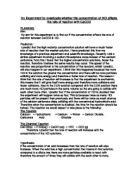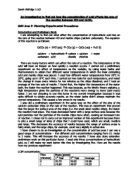The Equation
Calcium + Hydrochloric = Calcium + Water + Carbon Dioxide.
Carbonate Acid Chloride
The Chemical Equation
CaCO3(s) + 2HCl(aq) = CaCl2 (aq) + H2O + CO2 (g)
Therefore I predict that the rate of reaction will increase with the concentration of the HCl solutions.
Hypothesis:
If the concentration of an acid increases then the rate of reaction will also increase. When the acid has a high concentration that means in that solution, compared to a dilute one there are more particles available to react with therefore the amount of times they will collide with the each other is more.
Introduction:
There are many different factors, which affect the rate of reaction. Below is most of the known factors which effect the rate of a reaction:
1. The size of the particles of a solid reactant.
2. The concentration of the reactants solution.
3. Pressure of then gas reactants (if any).
4. The temperature at which reactants undergo reaction.
5. The addition of other particles such as catalyst.
6. Other sources such as light in photosynthesis.
Particle size
The reaction between calcium carbonate and dilute hydrochloric acid is used to prepare CO2. Varying the size of the Calcium Carbonate can make this reaction have a different rate. We could try using one single lump or powder and see which reaction would take longer. Below is an expected graph for three different sized chips of CaCO3 reaction with the HCl:
One point to note be that the factors do not effect the amount produced but only speed up the rate of the reaction.
Concentration
Concentration is a very important factor in rates of reaction. The concentration of a solution can greatly effect a reaction this is because there will be more particles of the reactant to react with, which will increase the time taken for the reaction.
If the concentration of an acid is increased, the rate of reaction will increase because the collision rate would be higher and the amount of CO2 would be given out more quickly. Below is an example graph as you can see that the high concentration will react:
Temperature
The higher the temperature the more energy each particle will have which means it will vibrate more, causing the amount of collisions to increase. As the particles collide more than usual at a high temperature then it will have a high chance of reacting, this will increase the rate of reaction. Below is a graph of how temperature and the rate of the reaction are related:
Activation Energy
Activation Energy is an amount of Energy needed for a reaction to occur, this amount varies from different elements and type of reaction. This may save energy for industrial use, as they will only supply the amount of energy needed exactly and not more.
The Collision Theory
From the kinetic theory of gases, the collision theory of bimolecular reactions in a gas phase was developed. In a reaction between two gaseous substances A&B a molecule of A must collide with B for the reaction to proceed but in a concentrated solution there will be a higher percent of reactants which will have no more energy. Not all collisions cause a reaction, only the ones which reach the activation energy of the reaction. This is why I predict that the rate of reaction will increase as the concentration of a solution increases.
Apparatus:
Conical flask
Marble chips (CaCO3) powder
Acid (HCl)
measuring cylinder (5 ml)
Glass tube
Clock
Clamp
Balance
Cork
Glass tube
Method:
First, I prepared the apparatus above; I found that the apparatus were good enough to carry out the experiment and get reliable results. First of all, I will use the balance to weigh out 1g of CaCO3, Which is in small rocks. Making sure the apparatus is safe and then you will be able to measure out the amount of acid decided on, and add it to the conical flask. Also, after measuring the CaCO3 you would be able add that to the conical flask. To keep the experiment fair you need to always place the acid first then the Calcium Carbonate or the opposite, this must be done all the time. As you add both reactants to a conical flask, you must immediately place the cork onto the flask. There is also the beaker where the gas is collected and connected to a glass tube and the cork; the gas collected would be CO2. The range for the concentration of the acid I would use is 0.00, 0.5, 1.0, 1.5 and 2.0 mol / dm3. To keep the experiment fair I will keep the temperature of the solution constant at room temperature as well as the particle size of the Calcium Carbonate. You also have to make sure that the amount of CaCO3 must be kept constant so I will use 1g. In addition, I will use a clock to measure the rate of reaction from as soon as the reactants are put together. The measurements will all be taken to 2d.p. to ensure they are all fair.
Risk Assessment
I will wear safety glasses to protect my eyes from any accidents that may occur. Lab coats will be worn to ensure clothes stay free from unwanted stains. I will also have to check the apparatus for any broken pieces, that way; I can avoid injury to myself or avoid a mistake in my experiment through a leak. The most important thing is safety. Also, with the stronger molarity solutions, they may be corrosive, so I must take care not to spill any onto bare skin.
Fair Test
We must make sure that we use the same size and roughly the same mass of chips, this is because we want to keep the chips roughly the same all the way through the experiment so that it will be a fair test and the results we be in relation to each other, otherwise the results will be completely different to what we will expect and it will ruin the experiment. We must also take our readings at the same intervals throughout the experiment i.e. I will take a reading every thirty seconds for all of my experiments.
Empty Results Table
Distilled Water
Time taken (seconds) Volume of CO2 collected in beaker(cm3)
0.5
1.0
1.5
2.0
2.5
3.0
3.5
4.0







